noun clause
什么叫名词性从句
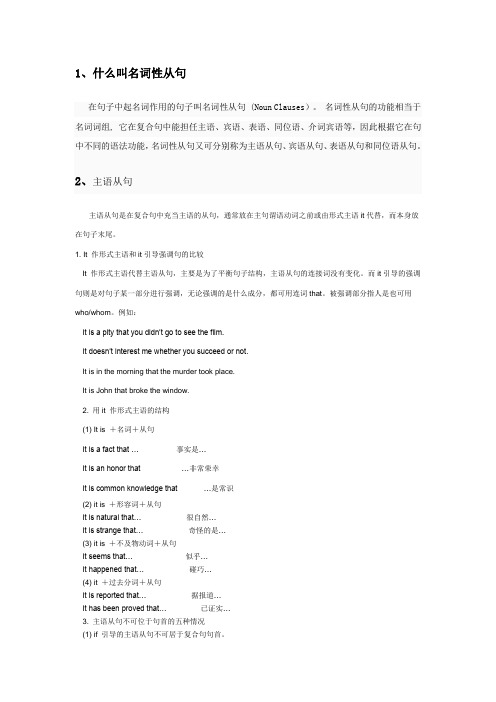
1、什么叫名词性从句在句子中起名词作用的句子叫名词性从句 (Noun Clauses)。
名词性从句的功能相当于名词词组, 它在复合句中能担任主语、宾语、表语、同位语、介词宾语等,因此根据它在句中不同的语法功能,名词性从句又可分别称为主语从句、宾语从句、表语从句和同位语从句。
2、主语从句主语从句是在复合句中充当主语的从句,通常放在主句谓语动词之前或由形式主语it代替,而本身放在句子末尾。
1. It 作形式主语和it引导强调句的比较It 作形式主语代替主语从句,主要是为了平衡句子结构,主语从句的连接词没有变化。
而it引导的强调句则是对句子某一部分进行强调,无论强调的是什么成分,都可用连词that。
被强调部分指人是也可用who/whom。
例如:It is a pity that you didn’t go to see the film.It doesn’t interest me whether you succeed or not.It is in the morning that the murder took place.It is John that broke the window.2. 用it 作形式主语的结构(1) It is +名词+从句It is a fact that … 事实是…It is an honor that …非常荣幸It is common knowledge that …是常识(2) it is +形容词+从句It is natural that… 很自然…It is strange that… 奇怪的是…(3) it is +不及物动词+从句It seems that… 似乎…It happened that… 碰巧…(4) it +过去分词+从句It is reported that… 据报道…It has been proved that… 已证实…3. 主语从句不可位于句首的五种情况(1) if 引导的主语从句不可居于复合句句首。
高中英语教资语法点-从句
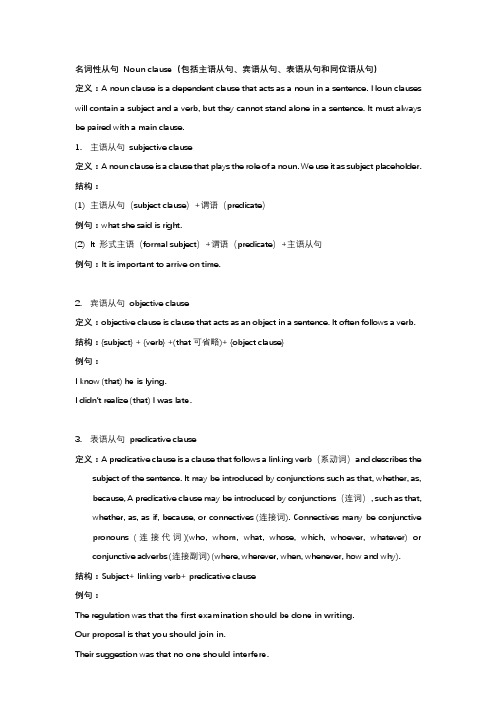
名词性从句 Noun clause(包括主语从句、宾语从句、表语从句和同位语从句)定义:A noun clause is a dependent clause that acts as a noun in a sentence. Noun clauses will contain a subject and a verb, but they cannot stand alone in a sentence. It must always be paired with a main clause.1.主语从句 subjective clause定义:A noun clause is a clause that plays the role of a noun. We use it as subject placeholder.结构:(1)主语从句(subject clause)+谓语(predicate)例句:what she said is right.(2)It 形式主语(formal subject)+谓语(predicate)+主语从句例句:It is important to arrive on time.2.宾语从句 objective clause定义:objective clause is clause that acts as an object in a sentence. It often follows a verb. 结构:{subject} + {verb} +(that可省略)+ {object clause}例句:I know (that) he is lying.I didn’t realize (that) I was late.3.表语从句 predicative clause定义:A predicative clause is a clause that follows a linking verb(系动词)and describes the subject of the sentence. It may be introduced by conjunctions such as that, whether, as, because, A predicative clause may be introduced by conjunctions(连词), such as that, whether, as, as if, because, or connectives (连接词). Connectives many be conjunctive pronouns (连接代词)(who, whom, what, whose, which, whoever, whatever) or conjunctive adverbs (连接副词) (where, wherever, when, whenever, how and why).结构:Subject+ linking verb+ predicative clause例句:The regulation was that the first examination should be done in writing.Our proposal is that you should join in.Their suggestion was that no one should interfere.注:if不能引导表语从句。
名词性从句(Noun Clauses)
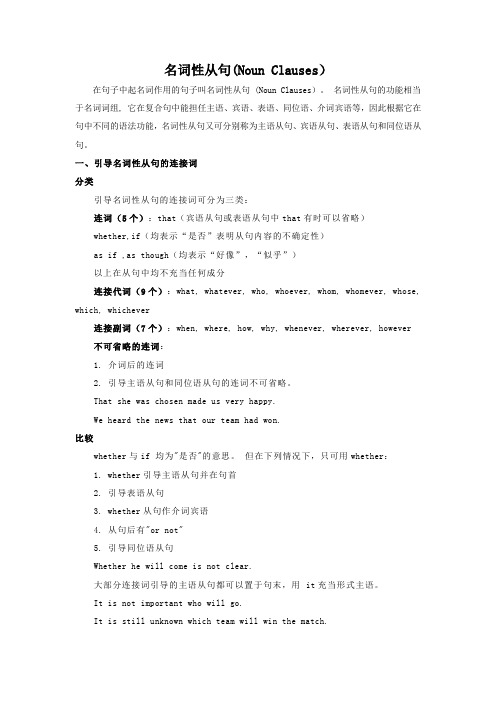
名词性从句(Noun Clauses)在句子中起名词作用的句子叫名词性从句 (Noun Clauses)。
名词性从句的功能相当于名词词组, 它在复合句中能担任主语、宾语、表语、同位语、介词宾语等,因此根据它在句中不同的语法功能,名词性从句又可分别称为主语从句、宾语从句、表语从句和同位语从句。
一、引导名词性从句的连接词分类引导名词性从句的连接词可分为三类:连词(5个):that(宾语从句或表语从句中that有时可以省略)whether,if(均表示“是否”表明从句内容的不确定性)as if ,as though(均表示“好像”,“似乎”)以上在从句中均不充当任何成分连接代词(9个):what, whatever, who, whoever, whom, whomever, whose, which, whichever连接副词(7个):when, where, how, why, whenever, wherever, however 不可省略的连词:1. 介词后的连词2. 引导主语从句和同位语从句的连词不可省略。
That she was chosen made us very happy.We heard the news that our team had won.比较whether与if 均为"是否"的意思。
但在下列情况下,只可用whether:1. whether引导主语从句并在句首2. 引导表语从句3. whether从句作介词宾语4. 从句后有"or not"5. 引导同位语从句Whether he will come is not clear.大部分连接词引导的主语从句都可以置于句末,用 it充当形式主语。
It is not important who will go.It is still unknown which team will win the match.二. 主语从句作句子主语的从句叫主语从句。
名词性从句 - Noun Clauses

插入语
How long do you think this fine weather will last? How long do you think will this fine weather last?
宾
宾语从句 Object Clause
有时用it作形式宾语,真正的宾语从句置于句末。 常见的动词有:think, consider, believe, feel, find, make;
appreciate, dislike, hate, like; have, put, take; depend/rely on(相信;指望),see to(确保), answer for(保证)
宾
宾语从句 Object Clause
有时用it作形式宾语,真正的宾语从句置于句末。
He has made it clear that he will not give in. We all thought it a pity that the conference should have
Noun Clauses
Y
UN ANG SENIOR HIGH SCHOOL
主
主语从句 Subject Clause
状 状语从句
补 定语从句
宾 宾语从句 Object Clause
谓
表语从句 Predictive Clause
同
定
表
பைடு நூலகம்
同位语从句 Appositive Clause
名词性从句 Noun Clause
宾
宾语从句 Object Clause
注意:疑问词 + do you think/believe/suppose/expect/imagine + 陈述句
英语从句知识点总结
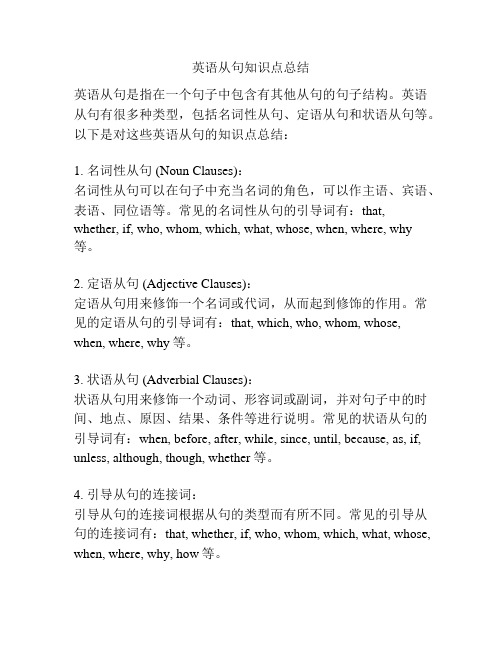
英语从句知识点总结英语从句是指在一个句子中包含有其他从句的句子结构。
英语从句有很多种类型,包括名词性从句、定语从句和状语从句等。
以下是对这些英语从句的知识点总结:1. 名词性从句 (Noun Clauses):名词性从句可以在句子中充当名词的角色,可以作主语、宾语、表语、同位语等。
常见的名词性从句的引导词有:that, whether, if, who, whom, which, what, whose, when, where, why等。
2. 定语从句 (Adjective Clauses):定语从句用来修饰一个名词或代词,从而起到修饰的作用。
常见的定语从句的引导词有:that, which, who, whom, whose, when, where, why等。
3. 状语从句 (Adverbial Clauses):状语从句用来修饰一个动词、形容词或副词,并对句子中的时间、地点、原因、结果、条件等进行说明。
常见的状语从句的引导词有:when, before, after, while, since, until, because, as, if, unless, although, though, whether等。
4. 引导从句的连接词:引导从句的连接词根据从句的类型而有所不同。
常见的引导从句的连接词有:that, whether, if, who, whom, which, what, whose, when, where, why, how等。
5. 从句的位置:从句可以出现在主句前面、中间或后面,具体的位置取决于从句的类型和句子的结构。
6. 省略从句的连接词:在某些情况下,从句的连接词可以省略,只保留从句的其他成分,例如主语、谓语等。
7. 从句的语序:从句的语序与主句的语序有所不同。
在陈述语序中,从句的语序和主句的语序一致;而在疑问语序中,从句的语序要倒装。
以上是英语从句的一些基本知识点总结。
noun clauses
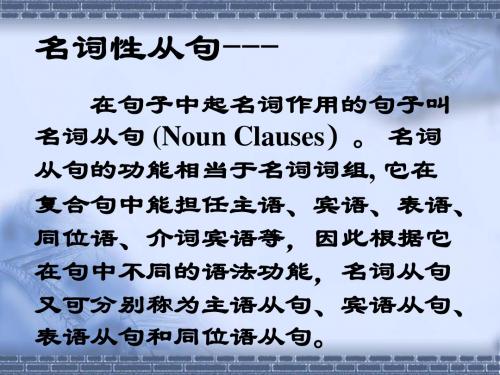
What I want to say is that we must start now. I don’t know whether he will come here. I told her the truth that he had gone abroad.
主语从句--主语从句--在句中做主语的句子, 在句中做主语的句子,处于从属 的位置, 的位置,这样的句子叫主语从句
The idea that he gave surprises many people. . The idea that computers can recognize human voices surprises many people.
The news that Tom would go abroad is told by him. The news that he told me is that Tom would go abroad next year.
同位语从句--同位语从句
常跟在抽象名词后,说明其内容: 常跟在抽象名词后,说明其内容: idea news fact promise answer belief condition doubt fear hope problem proof question reply report suggestion thought truth
名词性从句--名词性从句--在句子中起名词作用的句子叫 名词从句 (Noun Clauses)。 名词 )。 从句的功能相当于名词词组, 从句的功能相当于名词词组 它在 复合句中能担任主语、宾语、表语、 复合句中能担任主语、宾语、表语、 同位语、介词宾语等, 同位语、介词宾语等,因此根据它 在句中不同的语法功能, 在句中不同的语法功能,名词从句 又可分别称为主语从句、宾语从句、 又可分别称为主语从句、宾语从句、 表语从句和同位语从句。 表语从句和同位语从句。
英语名词性从句Noun Clause
英语名词性从句Noun Clause 英语名词性从句 Noun Clause英语中的从句是一种句子结构,它包括主语从句、宾语从句、表语从句和同位语从句等。
其中,名词性从句(Noun Clause)作为一个整体可以在句子中充当名词的角色。
本文将详细介绍名词性从句的定义、分类及其在句子中的应用。
一、名词性从句的定义名词性从句是指充当名词的作用,并在句子中担任特定成分的从句结构。
它可以充当主语、宾语、表语、同位语或介词宾语等,根据在句子中充当的角色不同,名词性从句分为主语从句、宾语从句、表语从句和同位语从句。
二、主语从句主语从句在句子中作为主语出现,一般用于强调句型或感叹句型中,通常以 "that" 或 "whether/if" 引导。
例如:- That he can sing well is known to everyone.(他唱歌好是众所周知的。
)- Whether he will come to the party is still uncertain.(他是否会来参加派对还不确定。
)三、宾语从句宾语从句在句子中作为动词或介词的宾语,引导词根据宾语从句的内容和语义不同而变化。
例如:- I believe that she is innocent.(我相信她是无辜的。
)- He asked me where I was going.(他问我要去哪里。
)四、表语从句表语从句在句子中作为主语补足语,常用引导词有 "that" 和"whether/if"。
例如:- My wish is that she succeeds in her career.(我希望她在事业上能够成功。
)- The question is whether we should take immediate action.(问题是我们是否应该立即采取行动。
noun clauses
None Clauses在句子中起名词作用的句子叫名词从句(Noun Clauses)。
名词从句的功能相当于名词词组, 它在复合句中能担任主语、宾语、表语、同位语、介词宾语等,因此根据它在句中不同的语法功能,名词从句又可分引导名词性从句的连接词引导名词性从句的连接词可分为三类:连接词:that, whether, if 不充当从句的任何成分连接代词:what, whatever, who, whoever, whom, whose, which.连接副词:when, where, how, why一主语从句Subject clause主语从句在句中作主语,它的位置与陈述句基本结构中的主语相同,引导主语从句的词有:1)连词that (无词义),whether (是否)例如:Whether the 11th sports meeting will be held in our city has not been decided. Tips:已经确定的事情that引导,没有确定的whether引导2)连接代词:what; who; which; whose;whoever; whatever; whicheverE.g. What he is has nothing to do with you 谁去参加这次能源大会并不重要Who will go to the energy conference is not importantWhatever she wants is fine with me3)连接副词when, where, wherever, why, how, 以及与how 组成的短语how long,how often, how soon, how far, howmany, how much等How we can protect the grain from damp needs to be discussed.他去哪都与我无关Wherever he goes has nothing to do with me.Attention:1)很多主语从句都可以用在it作形式主语的句子中It is not important who will go.It is still unknown which team will win the match.用it作形式主语的that-从句有以下四种不同的搭It is necessary that…有必要……It is important that…重要的是……It is obvious that…很明显……b. It + be + -ed 分词+ that-从句It is believed that…人们相信……It is known to all that…众所周知……It has been decided that…已决定……c. It + be +名词+ that-从句It is common knowledge that………是常识It is a surprise that…令人惊奇的是……It is a fact that…事实是……d. It +不及物动词+ that-分句It appears t hat…似乎……It happens that…碰巧……It occurred to me that…我突然想起……2)连接代词和连接副词引导的主语从句是由特殊疑问句转化而来的,要用陈述语序E.g. What the weather will be like for the next three days is of great importance. How much we can spend must be agreed on.whether 引导主语从句时,不能用if 替换宾语从句的位置与陈述句基本结构中的宾语相同,宾语从句可以作为谓语动词的宾语,也可作为介词和非限定动词(动词不定式,动名词,分词)和某些形容词的宾语。
从句的种类及使用方法
从句的种类及使用方法从句是句子中的一种独立成分,它可以包含主语、谓语和宾语,可以在句子中充当名词、形容词或副词。
从句分为三种基本类型:名词从句、形容词从句和副词从句。
下面是每种从句的详细说明及使用方法:1. 名词从句(Noun Clauses):名词从句用来在句子中充当名词的角色,作主语、宾语、表语或介词宾语。
一般由关系代词(如that, whom, who, which)或连接词(如whether, if)引导。
例如:-主语从句:Why he did that remains a mystery.(为什么他那样做仍然是个谜。
)-宾语从句:I don't know where he went.(我不知道他去了哪里。
)-表语从句:The important thing is that you try your best.(重要的是你尽力而为。
)-介词宾语从句:I'm not sure about whether I should go or not.(我不确定我是否应该去。
)2. 形容词从句(Adjective Clauses):形容词从句用来描述或修饰名词,通常由关系代词(如that, who, whom, which, whose)引导。
例如:- The book that I bought is on the table.(我买的书在桌子上。
)- He is the man who saved my life.(他是救了我命的人。
)3. 副词从句(Adverb Clauses):副词从句用来修饰动词、形容词或副词,并回答疑问词(如when, where, why, how, etc.)引导的问题。
例如:- When he arrived, everyone was already there.(当他到达时,所有人已经在那里了。
)- She speaks English better than I do.(她的英语说得比我好。
(完整版)nounclause名词性从句
noun (nominal) clauseDEFINITIONIn English grammar, a noun clause is a dependent clause that functions as anoun (that is, as a subject, object, orcomplement) within a sentence. Also known as a nominal clause.Two common types of noun clause in English are that-clausesand wh-clauses:•that-clause: I believe that everything happens for a reason.•wh-clause: How do I know what I think, until I see what I say? See Examples and Observations below.Also see:•Practice in Building Sentences With Noun Phrases and Noun Clauses•Anticipatory It and Dummy It•Complement Clause•Extraposition•Gerund•Infinitive•Noun Phrase•Putative Should•That-Clause•What-ClauseEXAMPLES AND OBSERVATIONS•"When Mrs. Frederick C. Little's second son arrived, everybody noticed that he was not much bigger than a mouse."(E.B. White, Stuart Little, 1945)•"What I like doing most of all in the evenings, these days, is sitting in a gormless stupor in front of the television, eatingchocolate."(Jeremy Clarkson, The World According to Clarkson. Penguin Books, 2005)•"A university is what a college becomes when the faculty loses interest in students."(John Ciardi, Saturday Review, 1966)•"I know that there are things that never have been funny, and never will be. And I know that ridicule may be a shield, but it is not a weapon."(Dorothy Parker)•"I believe that there is a subtle magnetism in Nature, which, if we unconsciously yield to it, will direct us aright."(Henry David Thoreau, "Walking")•"The thought of stars contributed to the power of his feeling. What moved him was a sense of those worlds around us, our knowledge however imperfect of their nature, our sense of their possessing some grain of our past and of our lives to come."(John Cheever, Oh What a Paradise It Seems. Random House, 1982)•"Whoever was the person behind Stonehenge was one dickens ofa motivator, I'll tell you that."(Bill Bryson, Notes From a Small Island. Doubleday, 1995) •"How we remember, what we remember, and why weremember form the most personal map of our individuality."(Christina Baldwin)•"How people knew when they were being trailed he found himself unable to imagine."(Edmund Crispin [Robert Bruce Montgomery], Holy Disorders, 1945)•"This is the story of what a Woman's patience can endure, and of what a Man's resolution can achieve."(Wilkie Collins, The Woman in White, 1859)•"I knew exactly how clouds drifted on a July afternoon, what rain tasted like, how ladybugs preened and caterpillars rippled, what it felt like to sit inside a bush.”(Bill Bryson, The Life and Times of the Thunderbolt Kid.Broadway Books, 2006)•"That dogs, low-comedy confederates of small children and ragged bachelors, should have turned into an emblem of having made it to the middle class—like the hibachi, like golf clubs and a second car—seems at the very least incongruous."(EdwardHoagland, "Dogs, and the Tug of Life")•Nominal Clauses as Direct Objects- "All sentences, then, are clauses, but not all clauses aresentences. In the following sentences, for example, the directobject slot contains a clause rather than a noun phrase. These are examples of nominal clauses (sometimes called 'noun clauses'):•I know that the students studied their assignment.•I wonder what is making Tracy so unhappy.These nominal clauses are examples of dependent clauses—in contrast toindependent clauses, those clauses that function ascomplete sentences."(Martha Kolln and Robert Funk, Understanding EnglishGrammar, 5th ed., Allyn and Bacon, 1998)- "A Colorado study found that the average homeless person cost the state forty-three thousand dollars a year, while housing that person would cost just seventeen thousand dollars."(James Surowiecki, "Home Free?" The New Yorker, September 22, 2014)•Noun-Clause Starters"We use various words to start noun clauses. . . ."These words include the word that, which in its role as a nounclause starter is not a relative pronoun, for it serves nogrammatical role in the clause; it just starts the clause. Forexample: The committee stated that it would follow the agent'spolicy. Here the noun clause serves the noun role of directobject of thetransitive verb stated. But a careful look at the clause reveals that the word that does not serve any role within the clause, other than simply to get it going."Other noun clause starters do serve grammatical roles within the clause. For example: We know who caused all the trouble. Here the noun clause starter is the relative pronoun who. Notice that inside the noun clause who serves as the grammatical subject of the verb caused."Additional words serve as noun clause starters. A relativeadverb can get one going: How he won the election mystified the pundits. So can a relative pronoun acting as an adjective: Weknow which career she will pursue. In these two sentences, how is an adverb modifying the verb won, and which is arelative-pronoun-adjective modifying the noun career."(C. Edward Good, A Grammar Book for You and I--Oops,Me! Capital Books, 2002)•"I have run,I have crawled,I have scaled these city walls,These city wallsOnly to be with you,Only to be with you.But I still haven't found what I'm looking for."。
- 1、下载文档前请自行甄别文档内容的完整性,平台不提供额外的编辑、内容补充、找答案等附加服务。
- 2、"仅部分预览"的文档,不可在线预览部分如存在完整性等问题,可反馈申请退款(可完整预览的文档不适用该条件!)。
- 3、如文档侵犯您的权益,请联系客服反馈,我们会尽快为您处理(人工客服工作时间:9:00-18:30)。
1. That is _________________________ (他是如何救那个男孩的) 2. That’s why ________________________ (昨天我不能去参加聚会的原因). 3. ____________who can help me out. (问题在于) 4. _______________(我的建议是)that we should go to help her at once. 5. _________________(他的困难时)that he can’t find a job. 6.What I wanted to know was________________ (谁将去那个可怕的地方观赏)
7.The important thing is ___________,but not___________________. 重要的是你做什么,而不是你说什么。 8.He has made __________he will not give in. 他清楚地表明他不会屈服。 9.Everyone _____ that we are all busy all day. 每个人都知道我们忙了一整天。
